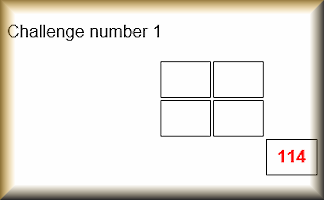

12
34
24
13
83

Change the numbers on the apples so that the number on the lemon is 88.
Now try some more Lemon Law Challenges.
The Lemon Law states that the numbers on the apples are all single-digit, non-negative integers. The numbers on the oranges combine the apple numbers as tens and units. The number on the lemon is the sum of the oranges.
Can 88 be made according to the Lemon Law?
If not, can you prove it?
If it can be, how many different ways can it be done?
Which numbers can be made by the Lemon Law?
Topics: Starter | Algebra | Functions | Puzzles
How did you use this starter? Can you suggest
how teachers could present or develop this resource? Do you have any comments? It is always useful to receive
feedback and helps make this free resource even more useful for Maths teachers anywhere in the world.
Click here to enter your comments.
Previous Day | This starter is for 12 January | Next Day
Sign in to your Transum subscription account to see the answers
Note to teacher: Doing this activity once with a class helps students develop strategies. It is only when they do this activity a second time that they will have the opportunity to practise those strategies. That is when the learning is consolidated. Click the button above to regenerate another version of this starter from random numbers.
There is a printable worksheet to go with this activity.

Your access to the majority of the Transum resources continues to be free but you can help support the continued growth of the website by doing your Amazon shopping using the links on this page. Below is an Amazon link. As an Amazon Associate I earn a small amount from qualifying purchases which helps pay for the upkeep of this website.
Educational Technology on Amazon

|
Teacher, do your students have access to computers such as tablets, iPads or Laptops? This page was really designed for projection on a whiteboard but if you really want the students to have access to it here is a concise URL for a version of this page without the comments: Transum.org/go/?Start=January12 However it would be better to assign one of the student interactive activities below. |
|
Here is the URL which will take them to a related student activity.
Victory Fanfare by Humanoide900 Creative Commons Licence